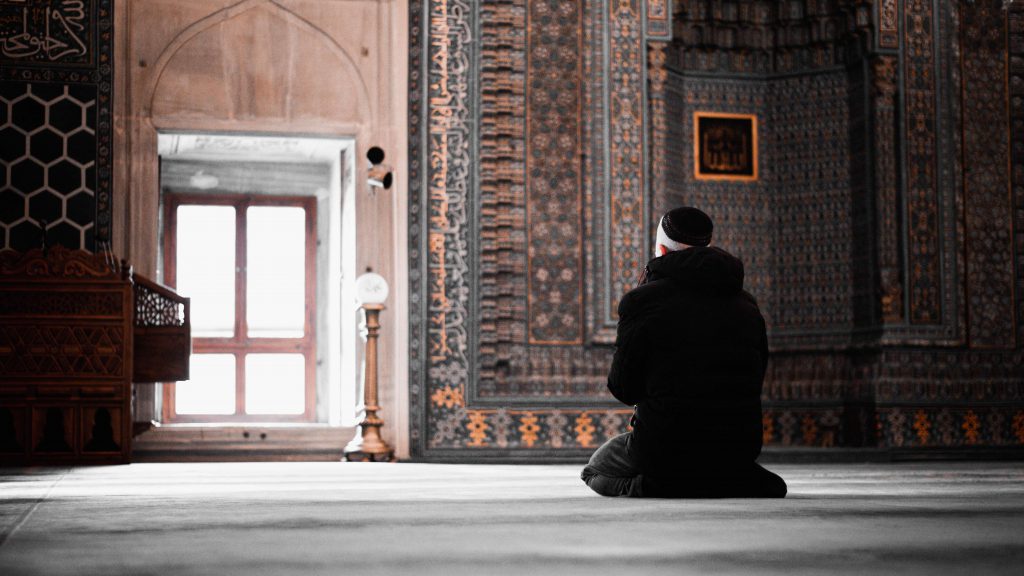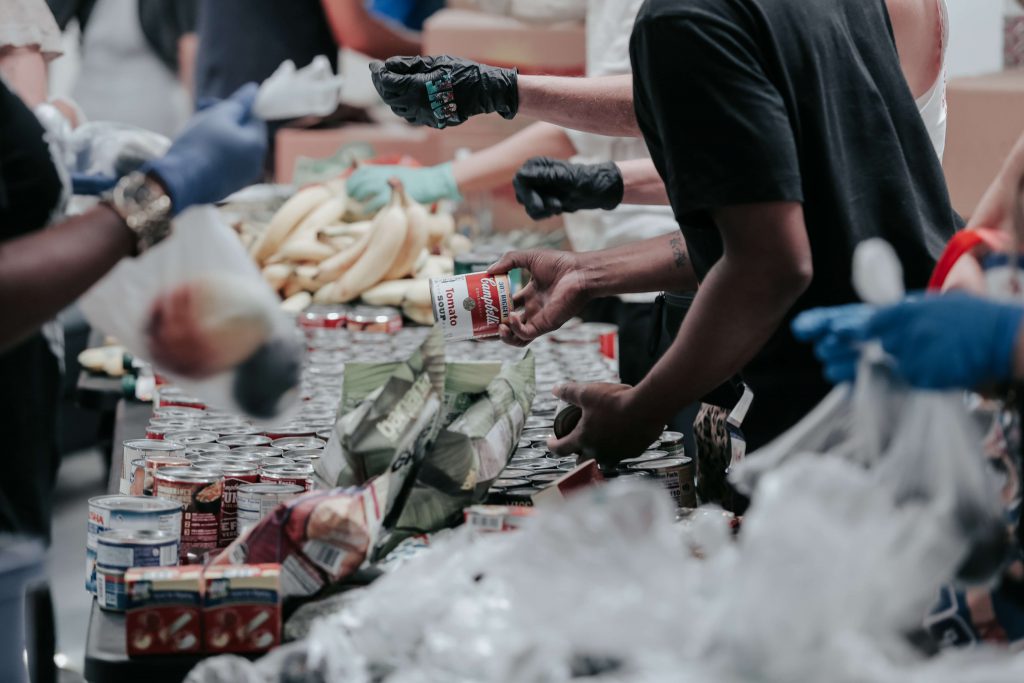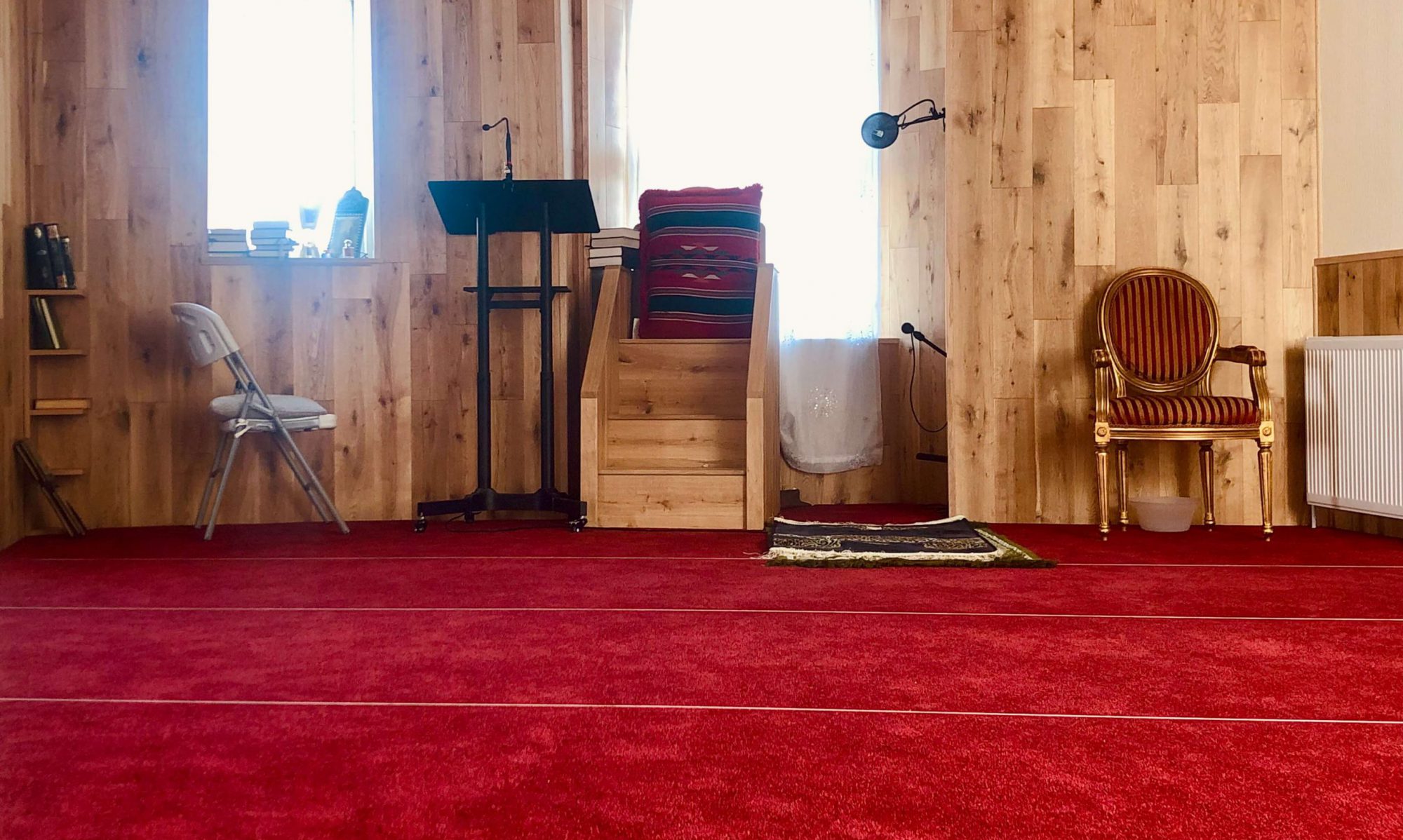وَٱلضُّحَىٰ ١ وَٱلَّيْلِ إِذَا سَجَىٰ ٢ مَا وَدَّعَكَ رَبُّكَ وَمَا قَلَىٰ ٣
[Quran 93:1-3]
waalḍḍuḥaē 1 • waallaili ìvá sajaē 2 • má wadda’aka Robbuka wamá qolaē 3
1. By the morning [light],
2. And the night when is darkens,
3. Your Master had not abandoned, nor dismissed, you.
TO SUMMARISE:
• Loneliness is temporary. Try to start each morning with a fresh positive attitude.
• Have trust in our Caretaker – God – who has promised us all a brighter future as believers.
• Remind yourself of reasons to be grateful, even from times of past suffering.
• Occupy yourself with acts of kindness and worship, such as voluntary work, and attendance to the mosque.
When Prophet Abraham gently pleaded his father to consider his Islamic way of life, he was kicked out the house [Quran 19:41-46]. When he provoked his community further on the matter, they sought to issue him a gruesome death penalty [Quran 37:83-97]. Yet, contrary to becoming alone, God turned his descendants into an uncountable nation of believers still living with us today. When the Mother of Prophet Moses was compelled to let go of her baby into a river, her heart was literally described as becoming “empty” [Quran 28:7-10]. While yearning for her newborn to be returned, God acknowledged her sadness and tears [Quran 20:37-40]. Yet, contrary to becoming alone, God reunited them alive and well, and gave her son the legacy of an honourable Messenger.
The holy Quran is not short of advice, reminders, and consolation that God, the Most Compassionate One, not only cares about the loneliness of His believers, but responds to them quickly, and rewards them immensely for bearing through it.
This article seeks to support revert muslims suffering from the natural feelings of becoming alone, perhaps through the loss of supporting family and friends, over their new found faith. With the vast wealth of guidance to be found in the Holy Quran, let us focus down on some practical advice and literary gems on this issue by looking through Chapter 93 of the Quran – Surah Ad-Duhaa (‘Chapter of the morning light’) – considered one of the most consoling chapters in the Quran.

A new day
Lets read the first verses shown at this beginning of this article. The Chapter begins with God (Allah in Arabic) taking an oath by the “morning” and the “night“. Immediately, we are reminded of a new day – which brings new opportunities. Try not to dwell on past grievances – embrace the energy of the morning light to restart your attitude afresh.
Indeed, a lack of natural sunlight – which helps our skin produce vitamin D, has been soundly linked to increased symptoms of depression. Consider any excuse to spend more time outdoors, and adding this vitamin to your diet – particularly during the season of long winter nights – if this could alleviate any such symptoms.
The oath here emphasise the truth of the following statements – that God has indeed not neglected His becoming Prophet – Muhammad (ﷺ, ‘with whom be peace’). Though oaths can be found across cultures and time (like how even in English we have the common expression “I swear to God…”), scholars have long studied that in the Quran, the subjects of God’s oaths have a direct link to the objects. So, just as the night feels lonely and desolate, that does not mean the joy of morning brightness will not follow soon.1 Arabic instructor Norman Ali Khan expands on the specific counselling power of the language in these verses here.
Historically, we know that this Chapter was revealed very early in the Prophethood of Muhammad (ﷺ) in Mecca, while he was still coming to terms with his new appointment. Though the very first revelations he had received at Mt. Hira had been a harrowing and shocking experience, Muhammad had come to find support from his comforting household that night.2 The events are retold by his later wife Aisha here. Eagerly, he waited days for more divine words of light to follow. Days turned into months, like a long night that would not end, and he started to hear words of doubt from his unsupportive relatives. It is amongst such anxiety that this Chapter was revealed, and the description of this introductory oath already encourages us as muslims to reframe loneliness as a temporary phase – like the cycle of day and night.
A brighter future
مَا وَدَّعَكَ رَبُّكَ وَمَا قَلَىٰ ٣ وَلَلْـَٔاخِرَةُ خَيْرٌۭ لَّكَ مِنَ ٱلْأُولَىٰ ٤ وَلَسَوْفَ يُعْطِيكَ رَبُّكَ فَتَرْضَىٰٓ ٥
[Quran 93:3-5]
má wadda’aka Robbuka wamá qolaē 3 • walalǎciróħu koiruñ llaka mina alǔlae 4 • walasaufa yu’ṭíka Robbuka fatarḍoẽ 5
3. Your Master had not abandoned, nor dismissed, you.
4. And the Latter [Life] sure is good for you – over the Former.
5. And your Master sure is going to give you – so you are [to be] pleased.
These verses immediately negate any sense of neglect that a muslim might feel of his Lord. The possibility of external rejection is denied with the reference to ‘abandonment’, and that of internal rejection is denied with the reference to ‘dismissal’. Stop thinking things are hopeless, and stop thinking you are worthless. Islam gives us security of faith, definiteness of purposes, and a tomorrow to always look forward too. Do not lose track of the brighter future that has been promised to us. Even if happiness is not found while we endure through this life, we always have unimaginable rewards of Paradise, and more, waiting for us in the next life, if we are only patient enough. The key word here in applying these verses to us is “Master” (Rab in Arabic, usually translated as ‘Lord’). This is one of the most common words in the Quran, and it shares the same root as that for ‘growth‘ and ‘sustenance‘. We must accept as Muslims that we have adopted God as our Caretaker – through ‘thick and thin’. There is a reason why God reassures us that the “ultimate finale is for the cautious ones“, often after discussing a disastrous event [Quran 7:127-128, 28:83]. Even in times of calamity, never forget that your Creator always intends good for you.
That being said, we can still request God to makes our circumstances easier in times of hardship. Talk to Him – express yourself, and ask for things, for He is the Provider – and importantly, it reinforces in us a healthy acceptance of our complete vulnerability before Him. There are many cases in the Quran where even Prophets seek for God’s help in desparate times. Prophet Yahya for example (referred to in Christendom as ‘John the Baptist’) was born as the answer to a prayer made by his elderly father Zachariah – who fretted that there was no one around him to maintain the call to righteousness after him [Quran 19:2-7]. Prophet Ayyub (biblically, ‘Job’) was tended to immensely after calling on God over his long period of illness. [Quran 21:83-84]. Whenever Muslims have something to ask of God, then indeed, He is near.
The following God-given du’a (meaning ‘prayer’ or ‘appeal’) is very well-known amongst Muslims, found in Chapter 2 of the Quran. Use it whenever you feel the need for it in your day-to-day life. It encompasses our balanced and positive attitude towards our short and long-term future:
Robbaná ǎtainá fid-dunyá ḥasanah, wafil-áciroti ḥasanah, waqiná ‘avában-nár
“Our Master, get us goodness in the Eathier [Life], goodness in the Latter [Life], and shield us from the Punishment of the Fire” [Quran 2:201].
A blessed past
أَلَمْ يَجِدْكَ يَتِيمًۭا فَـَٔاوَىٰ ٦ وَوَجَدَكَ ضَآلًّۭا فَهَدَىٰ ٧ وَوَجَدَكَ عَآئِلًۭا فَأَغْنَىٰ ٨
[Quran 93:6-8]
àlam yajidka yatímaña faǎwaē 6 • wawajadaka ḍõllaña fahadaē 7 • wawajadaka ‘ãìlaña faàgnaa 8
6. Did He not find you as an orphan – before sheltering?
7. And He found you lost – before guiding.
8. And He found you needy – before enriching.
Reading these verses we discover a one-word solution to loneliness and indeed all forms of Muslim depression – gratitude. After reminding of a brighter future, God demonstrates His love here in the past worldly context – pointing to physical, spiritual, and social vulnerabilities of Prophet Muhammad (ﷺ) during his younger life, and in turn how He tended to all of them. It was once again a complete negation of the possibility of God’s abandonment, and that such pessimism is really Satan’s exploitation of our forgetfulness to be grateful.

Even before he was born, Prophet Muhammad’s father Abdullah died of illness. He then went on to lose his beloved mother Aminah when he was six – becoming an “orphan”. After being passed “needy” from one family member to another, he found stability working for his first wife Khadijah as a young adult. The pain of this, what we could call today ‘childhood trauma’, itself leaves most of us much to be thankful for not having to experience.
Indeed, fully counting up how blessed we actually are is an impossible task [Quran 14:34]. Like the example in the central verse – “guiding” of the “lost“, which would also apply to revert muslims. Congratulations – God has at least gifted us with the correct belief, and beautified it in our hearts [Quran 49:7-8]. And this alone is something that we can never thank God enough for.
Therefore, next time you see someone who appears to have something you do not – be it close friends, a stable job, or a caring family, try this framework – immediately think instead of things you have that others do not.3 And think further – perhaps God was protecting you from bad company during your childhood? Perhaps that job you really want would introduce new unbearable stresses in your life? Perhaps God intends to reward you more than others for breaking free from the immoral blindness of your family members? We should take heed from loneliness to remove our expectations from people, and keep our trust in God’s plan for us. This and other practical advice for the feeling of neglect can be heard from Imam and Scholar Yasir Qadhi’s explanation of this Quranic chapter here.
Notice more, the language of the verses did not limit God’s acts of care singularly to the Prophet (ﷺ) (e.g. compare “before guiding you” to simply “before guiding” – where the receiver is left open). Do you think of times of suffering when you felt so helpless that it was like the whole world had just forgotten about you? God did not forget. Look back at these as periods of temporary difficulty that God climbed you out of and turned into a distant memory. Instead of cursing, give Him thanks – Alhamdu-Lillah – for He does this repeatedly as healthy spiritual training for the believers.
In fact, contrary to ‘suffering’ being an argument against a ‘Good God’, the Quran expresses repeatedly that suffering is a necessary ingredient for proper human development.4 Have a listen to the tough conversion journey of Kansas Mathematics Professor Jeffrey Lang as he found compelling answers to common atheistic questions like this from his reading of the Quran here. Suffering is negative if we decide it is so, but for Muslims, it is a test of our behaviour, ‘part and parcel’ of this temporary world, that we must undergo [Quran 18:7].
Be it big or small – from a loved one passing away, to a car splashing you – prevent the next cuss words from leaving the mouth. It is better to revere of God’s power and ask for forgiveness in these times, but if that is immediately too difficult, at least try keeping silent. You will notice that the very physical act of forcing yourself in this manner to grow into a hard-wired habit. Patience and endurance (both referred to in Arabic as sabr) is not only the proper response in such situations, but it is even a quality worth celebrating [Quran 2:155-156].
A productive present
فَأَمَّا ٱلْيَتِيمَ فَلَا تَقْهَرْ ٩ وَأَمَّا ٱلسَّآئِلَ فَلَا تَنْهَرْ ١٠ وَأَمَّا بِنِعْمَةِ رَبِّكَ فَحَدِّثْ ١١
[Quran 93:9-11]
fàmmá alyatíma falá taqhar 9 • waàmmá alssãìla falá tanhar 10 • waàmmá bini’maħi Robbika faḥaddiţ 11
9. So as for the orphan – do not oppress so.
10. And as for the asker – do not repel so.
11. And as for your Master’s favours – narrate so.
Now we come to the concluding advice of the chapter – do something positive for others with your newfound gratitude. Bringing joy to others brings joy to us. Having presented a bright future, and a blessed past – God finally motivated the Prophet (ﷺ) that there is no time like the present. Specific examples of good acts are given that would have resonated deeply with him – evoking him to empathise with the ‘orphan’ and the ‘needy one’ because of his former life (the Arabic word saa’il – translated here as “asker” – could refer to a ‘questioner’ or a ‘beggar’). Perhaps carry some spare food or change with you next time you leave the house in case you see someone on the street? Or if you are more motivated, is there a local charity or community centre that you sympathise with that needs volunteers?

Even if you find yourself isolated in your community, occupy yourself with physical work that is productive to yourself – schedule exercise, or read an interesting islamic book. Listen to islamic talk shows and podcasts that are positive, light-hearted, serious about God and Islam, and celebratory of others – as difficult as that may be to find. On the reverse side, avoid aggressive political debates and argumentative shows, at least temporarily. Now is also NOT the time to start mixing with bad company or accepting invitations to indecent places (pubs, nightclubs etc) out of desperation. Consider how far you have come, and take heed from an authentic quote from the Prophet Mohammed (ﷺ) – “A man follows the religion of his friend; so each one should consider whom he makes his friend.”5
As difficult as it is, there is no need to start developing a judgemental mindset towards others – even as a coping mechanism for loneliness. If you perceive friends to be distancing themselves from you, or revealing ‘true colours’ that are making them very disagreeable – simply allow yourselves to become apart on neutral terms. Some people (even muslims) are not meant to get along. Do not be upset at yourself if your intentions were good, and do not be angry at the other for ‘disappointing’ you or not ‘understanding’ you enough. We always have Satan to blame instead for causing rifts between people. When Prophet Abraham was threatened by his father after his call to Islam – his literally responded back with the most peaceful of words, and sought for God to forgive him [Quran 19:46-47].
The final verse gives us all a general principle to talk about the positives in life. Why not visit a few mosques (which hopefully you have available) to greet new people, and strengthen your bond with your true friend – God? Do not necessarily expect instant friendship or immediate personal support – but at least find yourself exchanging positive words with others. Attend a study group or class – even just as an observer. Listen to others. Though avoid conversations that belittle others – it is haram (meaning ‘illegal’) in Islam to slander our fellow muslims [Quran 49:11], and doing so at this time may even aggravate your conditions. Always try to stay in good company, and never stop expressing acts of gratitude.
May God relieve your hardship soon and reward you immensely.
TO SUMMARISE:
• Loneliness is temporary. Try to start each morning with a fresh positive attitude.
• Have trust in our Caretaker – God – who has promised us all a brighter future as believers.
• Remind yourself of reasons to be grateful, even from times of past suffering.
• Occupy yourself with acts of kindness and worship, such as voluntary work, and attendance to the mosque.
God knows best.
Last updated:
- Nouman Ali Khan – Official – Bayyinah [October 2, 2022], Allah has not Left You – A Deeper Look Series – Surah Al Duhaa – Nouman Ali Khan. ↩︎
- Sunnah.com [October 14, 2023], Sahih al-Bukhari 3. ↩︎
- EPIC MASJID [November 10, 2019], Shaykh Dr. Yasir Qadhi | Khutbah | Tafsir Surah al-Duha. ↩︎
- Islam On Demand [February 28 2011], The Purpose of Life – Jeffrey Lang. ↩︎
- Sunnah.com [October 14, 2023], Sunan Abi Dawud 4833. ↩︎
Jazak-Allah for reading. All knowledge, opinions, and translations expressed in our articles are the earnest study and reflections of the writer, prioritising honest interpretations of the Quran and authentic Hadith as evidence. Though the information contained does not necessarily represent the views of anyone other than the writer, all articles are cross-checked by brothers and sisters knowledgeable and experienced on the topic before being published on our site. We ask for forgiveness for presenting any information that comes to be incorrect or misleading, and accept that Allah is the Most-Knowing One.


